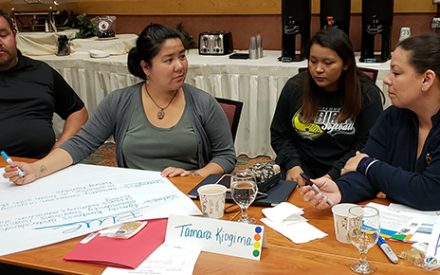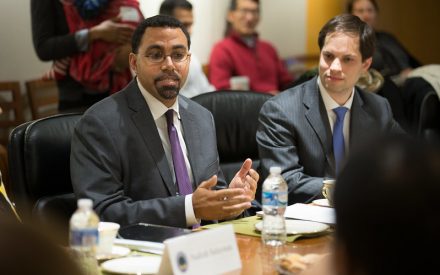Our nation is tackling a global health pandemic. Calls for reforms that place racial equity are front and center. Is the civic health of our communities strong enough to help us with the work that needs to be done? Will these two simultaneous and complex challenges generate increased civic health? How we come together to define and address these problems is crucial.
If I asked you to define the word health, you would most likely describe it as a person’s physical and mental condition, or the existence or absence of illness. We can apply a similar lens of health to examine our organizations and communities. The National Conference on Citizenship (NCoC), a nonprofit dedicated to strengthening civic life in America, is leading a nationwide Civic Health Initiative.
“We think of civic health as the manner in which communities organize to define and address public problems.”
– National Conference on Citizenship
Key indicators of civic health
- Social connectedness – interactions between friends, families and neighbors
- Community engagement – working with local institutions and fellow residents to promote meaningful actions, movements and relationships, such as: voting, talking politics, trusting local businesses and participating in community groups
- Community involvement – interactions beyond friends, families and neighbors, including group membership, charitable giving, volunteering and attending public meetings
- Political action and participation – ways people influence local government and public institutions, including: voting, contacting public officials, discussing politics and buying or boycotting goods to reflect political opinions
Note: definitions adapted from “Civic Health in Wisconsin: Connectedness in Context”
Why civic health matters
If you have poor physical health, you may find it affects your ability to do everyday things, your performance at work and your engagement with family and friends. Poor civic health affects communities and hinders progress towards improved social outcomes such as equitable access to quality healthcare, education, and job opportunities.
“NCoC research has demonstrated the relationship between civic engagement and economic resilience. It found that the density and type of nonprofit organizations in a community, as well as the community’s social cohesion, are important predictors of its ability to withstand unemployment in a recession.”
– National Conference on Citizenship
What we can do to improve civic health
Using NCoC’s indicators as a guide, we can collect data that tells us about the civic health of our communities. In 2019, the UW-Madison Center for Community and Nonprofit Studies, along with a coalition of nonpartisan organizations, partnered with NCoC to publish Civic Health in Wisconsin: Connectedness in Context.
Like all data, the information in this report is only useful if we do something with it. The coalition’s goal is to use the data to strengthen existing civic engagement efforts and seek out innovative new approaches to civic health. While a local analysis of your community’s civic health can be a helpful tool, there are things community members and leaders can do today that can lead to improved civic health.
Community design and placemaking
You might be surprised to know that “living near a well-attended, popular park is associated with higher levels of civic trust, including greater satisfaction with local government”. This finding comes from a 2016 study conducted by the Assembly Civic Engagement Survey. Suzanne Nienaber with the Center for Active Design shares the study in her National League of Cities article, “Five Ways to Promote Civic Health Through Community Design”.
The UW-Madison Division of Extension Design Wisconsin program is one way you and your community can apply principles of community design to improve civic health. The program encourages the exchange of ideas, formation of a vision, and development of a plan to help a community execute design improvements.
Leadership and youth engagement
Another strategy for improving civic health is through the intentional development of resident leaders and engagement of the next generation.
“American history and civic education, including what used to be called “Problems of Democracy” courses, are vital to equipping future leaders from all backgrounds and sectors with rich knowledge and understanding they need to be engaged citizens throughout their entire lives. Research has shown that students who receive effective civic learning are more likely to vote and discuss politics; four times more likely to volunteer and work on community issues; and more confident in their ability to speak publicly and communicate with their elected representatives.”
NCoC’s “Civic Deserts: America’s Civic Health Challenges”
Community-based leadership development
We focus on helping existing and emerging leaders learn more about their community, including its private, public and nonprofit sectors. Participants build their social networks, connect with opportunities to engage civically, and in some programs take on projects that address local issues.
Extension also supports Youth in Governance efforts where youth work alongside adults on government boards and committees, teen courts, and through youth boards to make decisions and take action as part of strengthening communities. One of Extension’s community-based leadership programs, Future Leaders Active in Government, is helping Columbia County youth improve skills that enable civic engagement, build important connections, learn to voice their opinions, and gain confidence in their ability to make a difference in addressing important issues in their community.
Facilitating community conversations
And a final idea on how you can improve civic health is to engage your community in a facilitated dialogue. By bringing together a diverse cross-section of your community to discuss critical issues, you are inviting people to be a part of understanding problems and finding solutions. When community members are invited to the table and feel like their voices are heard they are more likely to stay engaged. If you are interested in exploring the use of community conversations as a civic health strategy contact your local Extension educator.
Extension can help
Whether the issue is racial equity, a health pandemic, decreased funding for schools, an aging population, failing infrastructure, or a struggling downtown, the issues are big, complex and won’t be easy to solve.
Is the civic health where you live strong enough to help your community do the work that needs to be done? If the answer is no, then commit to taking a step towards improving your community’s civic health.
“Great things are done by a series of small things brought together”
– Vincent Van Gogh






